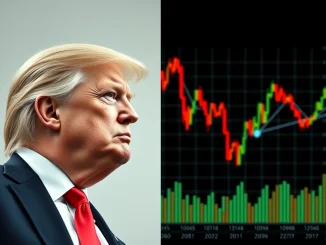
The world of finance is constantly evolving, with innovations like tokenized stock promising to revolutionize traditional markets. Yet, with great innovation comes the need for robust oversight. Recently, Citadel Securities, a prominent market-making firm, issued a powerful cautionary alert to U.S. regulators. Their message? The Securities and Exchange Commission (SEC) should firmly reject regulatory exemptions for tokenized equities, citing potential dangers to market stability and investor trust.
Why Citadel Sees Risks in Tokenized Stock Exemptions
On July 12, Citadel Securities, co-founded by Ken Griffin, delivered a stark warning to the SEC. Their core concern revolves around the potential for a fragmented regulatory landscape if tokenized assets are allowed to operate under different rules than traditional securities. Without a unified framework, they argue, tokenized assets could significantly destabilize market integrity and erode investor protection.
Citadel’s stance is clear: tokenization should not be granted lenient rules unless it demonstrably enhances innovation and efficiency without compromising existing safeguards. The firm’s letter to the SEC’s Crypto Task Force highlighted several critical concerns:
- Equal Standards: Tokenized securities must adhere to the same investor protection standards as traditional equities. This includes crucial principles like best execution, trade transparency, and fair access for all market participants.
- Liquidity Fragmentation: Lax regulation could lead to a splintering of liquidity across untransparent trading platforms, making it harder for investors to get fair prices and potentially marginalizing institutional investors like pension funds and banks.
- Investor Confusion: The firm warns of potential confusion regarding investor rights, voting mechanisms, and taxation tied to tokenized shares. This ambiguity could disrupt established markets, including ETFs and IPOs, by diverting liquidity from centralized, regulated systems.
- Regulatory Arbitrage: Allowing exemptions could incentivize firms to exploit loopholes, choosing jurisdictions or structures with the weakest oversight, thereby undermining global regulatory efforts.
The Global Call for Robust SEC Regulation
Citadel’s warning isn’t an isolated voice; it echoes broader concerns among global regulators grappling with the complexities of digital assets. The UK’s Financial Conduct Authority has already flagged significant gaps in crypto tax reporting, while the EU’s impending MiCA regulation aims to address systemic risks posed by stablecoins and fragmented oversight. These initiatives underscore a shared understanding that innovation, while vital, should not come at the expense of financial stability.
The firm specifically criticizes the practice of leveraging blockchain’s features—such as 24/7 trading, instant settlement, and fractional ownership—as justifications to bypass essential norms like transparency and accountability. The absence of a cohesive global framework exacerbates these market risks. While some regions, like the EU, are advancing structured regulations, others lag behind, creating uneven playing fields and potentially incentivizing firms to exploit regulatory loopholes.
Ensuring Market Integrity: A Balancing Act for Regulators
Citadel’s appeal serves as a critical call to action for regulators to prioritize collaboration, ensuring that innovation in tokenized equities does not compromise investor confidence or systemic stability. The firm’s deep roots in financial markets, particularly its role as a major market maker, lend significant weight to its concerns about market integrity.
The SEC’s response to Citadel’s intervention remains a key point of anticipation. Regulators face a delicate balancing act: fostering the undeniable benefits of tokenization—such as faster transactions and potentially lower costs—while mitigating the risks of uncoordinated oversight. For instance, the Tokyo Stock Exchange’s recent mandate for listed companies to adopt investor relations systems reflects growing demands for transparency, a challenge inherently compounded by the decentralized nature of tokenized assets.
Prioritizing Investor Protection in a Digital Future
As the sector evolves, the SEC’s decisions will shape whether tokenized stock becomes a mainstream financial tool or remains a niche product constrained by regulatory uncertainty. Citadel’s appeal to resist exemptions underscores the paramount need for a balanced approach—one that fosters innovation while upholding the principles of transparency and accountability that underpin global markets and safeguard investor protection.
The core message from Citadel Securities is clear: the promise of digital assets must not overshadow the proven necessity of robust SEC regulation. For the long-term health and credibility of financial markets, all participants—whether traditional or blockchain-based—must play by the same fundamental rules.
Frequently Asked Questions (FAQs)
What is tokenized stock?
Tokenized stock refers to digital representations of traditional shares of stock on a blockchain. These tokens aim to offer benefits like fractional ownership, 24/7 trading, and faster settlement, while still representing an underlying asset.
Why is Citadel Securities warning the SEC about tokenized stock?
Citadel Securities is concerned that without a unified regulatory framework, tokenized stock could fragment market oversight, erode investor protections, and destabilize market integrity by allowing regulatory arbitrage and inconsistent compliance standards.
What are Citadel’s main concerns regarding investor protection?
Citadel is worried about lax standards for best execution, trade transparency, fair access, and potential investor confusion over rights, voting mechanisms, and taxation for tokenized shares. They advocate for tokenized securities to adhere to the same investor protection standards as traditional equities.
How do global regulators view tokenized assets?
Global regulators, including the UK’s FCA and the EU with its MiCA regulation, are actively addressing the challenges posed by tokenized assets. They share concerns about fragmented oversight, crypto tax reporting gaps, and systemic risks, aligning with Citadel’s call for comprehensive regulation.
What is the potential impact if the SEC grants exemptions for tokenized stock?
If the SEC grants exemptions, Citadel warns it could lead to liquidity fragmentation, untransparent trading platforms, the marginalization of institutional investors, and disruptions to traditional ETF and IPO markets by diverting liquidity from centralized systems.
What is the key takeaway from Citadel’s appeal to the SEC?
The key takeaway is the need for a balanced approach to financial innovation. Citadel stresses that while tokenization offers benefits, it should not compromise the fundamental principles of transparency, accountability, and robust investor protection that underpin global financial markets, advocating for consistent SEC regulation across all asset classes.



